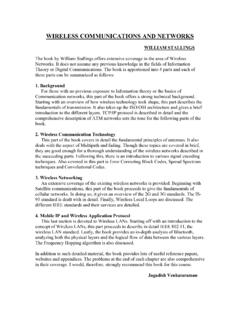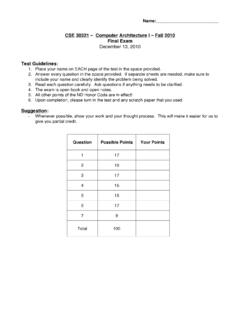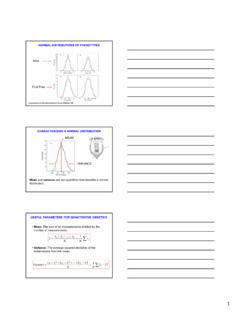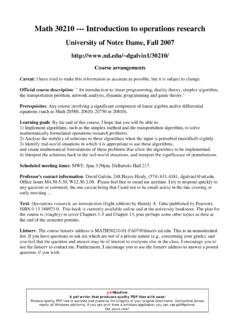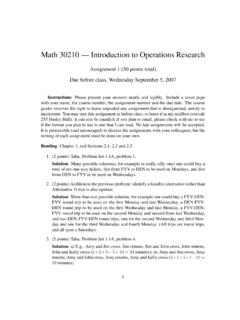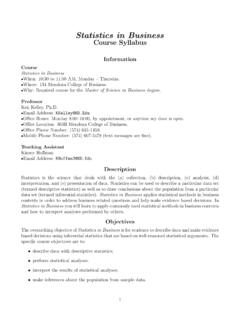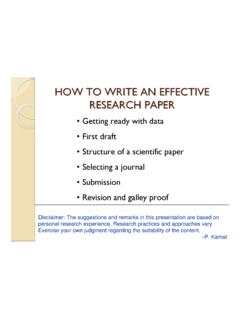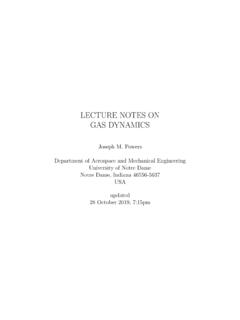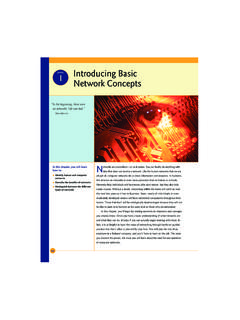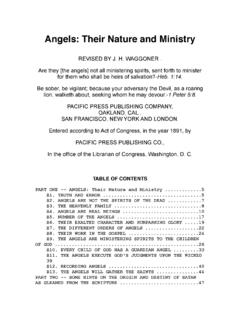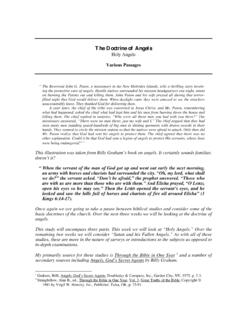Transcription of Angels and Demons - nd.edu
1 Angels and DemonsAlfred J. FreddosoUniversity of Notre DameAccording to Bertrand Russell s famous essay, A Free Man s Worship (1903), natural sciencehas shown the universe to be wholly indifferent to the hopes and aspirations of those cosmic accidentsknown as human beings, and, as a result, any honest modern reflection on the significance of human lifemust be based, in Russell s own words, on a firm foundation of unyielding despair. In effect, he istelling us, There is no God or divine providence, and there is no hope for eternal life. So there! Andeven though today s intellectuals are generally smart enough not to appeal solely to science to supportthis type of ultimate despair, many still agree with Russell that we live in a disenchanted world (read: no God, no soul and, most certainly, no Angels !). As Chesterton was to put it just a few years afterRussell s essay: When rationalists say that the ancient world was more enlightened than the Christian, fromtheir point of view they are right.
2 For when they say enlightened they mean darkened withincurable despair. It is profoundly true that the ancient world was more modern than theChristian. The common bond is in the fact that ancients and moderns have both beenmiserable about existence, about everything, while mediaevals were happy about that at least (Orthodoxy, chap. 9).Chesterton had earlier remarked that modern philosophy s despair is this, that it does not reallybelieve that there is any meaning in the universe. Indeed, one gets the distinct impression that manyamong today s intellectual elite prefer it this way, even if it makes their lives on the whole less deeplysatisfying. Apparently, there s something grown-up about embracing despair, and something childishabout looking for an , we Catholics would rather say childlike than childish . But there is no denying thatcompared to the world of ultimate despair, our world is more enchanted which is to say, moreinteresting, more dramatic, more adventuresome, and more challenging.
3 Life is a high stakes game for2every human being, and it abounds with opportunities and pitfalls. And, as they say, we are not alone. From our perspective, the world is in some ways against us and in some ways for us, but it is mostassuredly not indifferent to our hopes and aspirations. On the one side, through the merits of His Son,God provides for us not only the interior transformation and assistance worked by His grace, but also theexterior assistance of the communion of saints, among whom are numbered the good Angels . And linedup on the other side are the world, the flesh, and, yes, the devil, along with all his demonic followers. What more could you ask for by way of excitement? It s even better than Tolkien s The Lord ofthe Rings, where only a few angelic beings ( , Sauron, Saruman, and Gandalf) play a leading be sure, some unimaginative Catholics seem embarrassed by Angels . Sadly, when thepreliminary version of the new Catechism was first circulated, there were complaints that too much spacewas being devoted to the Angels ; my own view is that the final version devotes much too little space who are these Angels and Demons ?
4 What sort of beings are they? What do they know andwhen do they know it? How did the Demons go bad? And what do they have to do with us?Where better to look for answers to these questions than the Summa Theologiae of ThomasAquinas? In the First Part of the Summa St. Thomas deals with Angels and Demons in two separateplaces: first, in questions 50-64, which fall within his discussion of the various sorts of beings God hascreated, and, second, in questions 106-114, which fall within his discussion of how God governs theuniverse He has created. (If you d like to read these questions in a spanking new translation, ~afreddos/summa- )Even though we use the term angel to designate the beings in question, so that an angel can beeither good or bad, the term itself is derived from the Greek angelos, which means messenger andhence in its origin designates the role of the good Angels . This leads to a certain amount of confusion,since we sometimes use angel with a positive connotation (as in She is on the side of the Angels ) andsometimes without such a connotation (as in Lucifer is a fallen angel ).
5 In the writings of St. Thomas s3non-Christian philosophical predecessors, we find more neutral designations for angelic beings, , intellectual substance , separated substance , and intelligence . Even though St. Thomas believes thatdivine revelation is our firmest and most extensive source of information about the existence, nature, andfunctions of the Angels , he realizes that the classical pagan philosophers had, without the the aid ofrevelation, hit upon the idea of incorporeal (or immaterial) substances and had counted God, theseparated substances, and the human soul among them. In fact, St. Augustine tells us in his Confessions(book 7, chap. 1) that it was only through the help of Platonist philosophy that he was able to overcomeone of his principal intellectual difficulties with the Catholic Faith, viz., his inability to conceive of Godas something other than a bodily or corporeal being (even if a pretty wispy one).So the Angels are, like God, immaterial substances.
6 In the technical language that St. Thomasborrows from Aristotle, the Angels are pure forms rather than, like us, beings composed of matter andform. This fact has some interesting , none of an angel s acts depends on matter; hence, all of his acts are either intellectual acts ofknowing and willing or else the consequences of such acts. This means, for one thing, that Angels do nothave sensory cognition or any powers which, like imagination and sensory memory, are linked tosensation. (A question: Does this entail that there is no such thing as angelic art? Even if there is noangelic music or painting or architecture, are there, for instance, pieces of fiction passed from one angelto another? And might there be some angelic counterpart to the other arts?)Second, Angels do not have lower life-functions such as digestion, growth, or sexual reproduction. In fact, they cannot reproduce themselves in any way at all, since they do not have parts that can serve asangelic genetic material.
7 But, then again, neither do they grow old or suffer from sickness and physicaldeterioration. (For instance, unlike some of us oldsters, Angels do not need reading glasses of variousstrengths for different tasks!) Needless to say, Angels cannot die or, as St. Thomas would put it, , if Angels have some relation to places and to bodily things, then this relation is unlike4anything else we know with the possible exception of the very strange behavior attributed to thefundamental particles described by contemporary quantum physicists. Nonetheless, it is natural tobelieve at least some pretty impressive ancient philosophers did that the intelligences do have somesort of power over try to imagine what it would be like to be an incorporeal being with knowledge and power, butwithout sensation and sensory imagination. A little creepy, eh? You can t see or hear or smell anything. (We really do depend on and delight in our senses, and it is hard for us to imagine a being that learnsthings without them.)
8 What s more, you don t have any feelings or emotions, strictly speaking; your joyand peace and love are the quiet kind, simple acts of will. On the other hand, even though you do not getyour knowledge through sensation, you suddenly realize, upon closer in(tro)spection, that your re reallyquite the expert in mathematics and natural science, without ever having taken any courses and withouthaving devised any long proofs or carried out any experiments. In fact, your grasp of nature is asthorough as it was painless to acquire. You came by it naturally, as they say; you ve had it ever sinceyou popped into existence or, more accurately, ever since you were brought into s more, even though you have no body, you can move around really quickly. But tounderstand exactly what this means, we have to start with your relation to bodies located in space andtime. Generally speaking, you are present to a place when you use your power to act on the bodieslocated in that place. Unlike the bodies themselves, you are not contained by your place; for instance,you can, if you want to, go from point A to point B without tracing a continuous path between them.
9 Instead, like God Himself, you contain the place in the sense of being able to perform certain operationsthere. Of course, unlike God, you are not present to all of space through your power; nor are you able todo everything that God does in a given place. Instead, you are limited to effecting certain qualitative andquantitative changes in the bodies located in a particular place. Occasionally, as we read in SacredScripture, you may be called upon by God to fashion something that looks like a human body and to assume that body, thus taking on a human appearance in the manner of the archangel Raphael in the5book of Tobit. But in such a case, as Raphael himself makes clear in Tobit 12:18-19, your assumed bodyis not really a living human organism and does not really have life-functions like speaking and digestion. (Interestingly, you are related to this type of assumed human body in much the same way that Descartesmistakenly took human souls to be related to their bodies. But that is a story for another time.)
10 So youmove around by becoming present through your power to different places (or bodies) at different times;and you yourself get to choose where you will be your knowledge of nature, what other sorts of knowledge do you have? For instance, doyou know all that God intends to do? Do you know what your fellow Angels are thinking? Do you knowwhat human beings are thinking?Assuming for now that you are a good angel, the depth of your initial knowledge of God sintentions depends on where you stand in the hierarchy of Angels . According to tradition, bolstered byvarious passages from Sacred Scripture, there are nine orders of Angels , arranged in three hierarchies. The first and highest hierarchy contains, in descending order, the Seraphim, the Cherubim, and theThrones; the second hierarchy consists of the Dominations, the Virtues, and the Powers; and the thirdand lowest hierachy, the one that deals directly with human affairs, includes the Principalities, theArchangels, and the of the Angels in the highest hierarchy as something like close consultants who continuallyconfer with the commander-in-chief.
